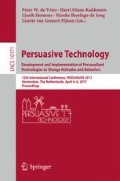Abstract
This paper considers how persuasive messages – within the healthy eating domain – should be communicated to individuals with different personality types. Following a personality assessment, subjects imagined themselves in a scenario and evaluated the effectiveness of messages constructed using Cialdini’s principles of persuasion. Our results suggest that messages exploiting the principle of authority are the most effective across a range of personality types. In addition, personality had a statistically significant impact on the persuasiveness of messages, with “conscientious” subjects more willing to be persuaded than others. Finally, we found that positively framed messages were more preferred than negatively ones. We also found some interaction effects between personality traits and Cialdini’s principles and framing on persuasiveness.
Access this chapter
Tax calculation will be finalised at checkout
Purchases are for personal use only
Notes
- 1.
Scarcity may still be good to use for reminders though.
- 2.
The indirectness was used to avoid effects of participants’ current eating habits.
References
Churchill, S., Good, A., Pavey, L.: Promoting the avoidance of high-calorie snacks. The role of temporal message framing and eating self-efficacy. Appetite 80, 131–136 (2014)
Lo, S.H., Smith, S.G., Taylor, M., Good, A., von Wagner, C.: The effect of temporal framing on behavioral intentions, expectations, and behavior: the case of healthy eating. J. Appl. Biobehav. Res. 17(3), 202–213 (2012)
Mazzotta, I., de Rosis, F., Carofiglio, V.: Portia: a user-adapted persuasion system in the healthy-eating domain. IEEE Intell. Syst. 22(6), 42–51 (2007)
Berkovsky, S., Freyne, J.: Group-based recipe recommendations: analysis of data aggregation strategies. In: Proceedings of the 4th ACM Conference on Recommender Systems, pp. 111–118. ACM, New York (2010)
Cialdini, R.B.: Influence: The Psychology of Persuasion. Harper Collins, New York (2009)
Masthoff, J., Grasso, F., Ham, J.: Preface to the special issue on personalization and behavior change. User Model. User-Adap. Inter. 24(5), 345–350 (2014)
Orji, R., Vassileva, J., Mandryk, R.L.: Modeling the efficacy of persuasive strategies for different gamer types in serious games for health. User Model. User-Adap. Inter. 24(5), 453–498 (2014)
Smith, K.A., Dennis, M., Masthoff, J.: Personalizing reminders to personality for melanoma self-checking. In: Proceedings of the 2016 Conference on User Modeling Adaptation and Personalization, pp. 85–93 (2016)
Michie, S., Richardson, M., Johnston, M., Abraham, C., Francis, J., Hardeman, W., Eccles, M.P., Cane, J., Wood, C.E.: The behavior change technique taxonomy (v1) of 93 hierarchically clustered techniques: building an international consensus for the reporting of behavior change interventions. Ann. Behav. Med. 46(1), 81–95 (2013)
Miceli, M., De Rosis, F.D., Poggi, I.: Emotional and non-emotional persuasion. Appl. Artif. Intell. 20(10), 849–879 (2006)
Grasso, F.: Rhetorical coding of health promotion dialogues. In: Dojat, M., Keravnou, E.T., Barahona, P. (eds.) AIME 2003. LNCS (LNAI), vol. 2780, pp. 179–188. Springer, Heidelberg (2003). doi:10.1007/978-3-540-39907-0_26
Grasso, F., Cawsey, A., Jones, R.: Dialectical argumentation to solve conflicts in advice giving: a case study in the promotion of healthy nutrition. Int. J. Hum. Comput. Stud. 53(6), 1077–1115 (2000)
Kaptein, M., Lacroix, J., Saini, P.: Individual differences in persuadability in the health promotion domain. In: Ploug, T., Hasle, P., Oinas-Kukkonen, H. (eds.) PERSUASIVE 2010. LNCS, vol. 6137, pp. 94–105. Springer, Heidelberg (2010). doi:10.1007/978-3-642-13226-1_11
Kaptein, M., Markopoulos, P., de Ruyter, B., Aarts, E.: Personalizing persuasive technologies: explicit and implicit personalization using persuasion profiles. Int. J. Hum. Comput. Stud. 77, 38–51 (2015)
Kaptein, M., van Halteren, A.: Adaptive persuasive messaging to increase service retention: using persuasion profiles to increase the effectiveness of email reminders. Pers. Ubiquit. Comput. 17(6), 1173–1185 (2013)
Kaptein, M.C., Markopoulos, P., de Ruyter, B., Aarts, E.: Persuasion in ambient intelligence. J. Ambient Intell. Hum. Comput. 1(1), 43–56 (2010)
Higgins, E.T.: Beyond pleasure and pain. Am. Psychol. 52(12), 1280–1300 (1997)
Dijkstra, A., Rothman, A., Pietersma, S.: The persuasive effects of framing messages on fruit and vegetable consumption according to regulatory focus theory. Psychol. Health 26(8), 1036–1048 (2011)
de Graaf, A., van den Putte, B., de Bruijn, G.J.: Effects of issue involvement and framing of a responsible drinking message on attitudes, intentions, and behavior. J. Health Commun. 20(8), 989–994 (2015)
Godinho, C.A., Alvarez, M.J., Lima, M.L.: Emphasizing the losses or the gains: comparing situational and individual moderators of framed messages to promote fruit and vegetable intake. Appetite 96, 416–425 (2016)
Amazon: Amazon mechanical turk (2016). www.mturk.com. Accessed 30 May 2016
Taylor, W.L.: Cloze procedure: a new tool for measuring readability. Journalism Q. 30, 415–433 (1953)
Randolph, J.J.: Free-marginal multirater kappa (multirater k[free]): an alternative to fleiss fixed-marginal multirater Kappa. In: Joensuu Learning and Instruction Symposium 2005 (2005)
Goldberg, L.R.: The structure of phenotypic personality traits. Am. Psychol. 48(1), 26–34 (1993)
Dennis, M., Masthoff, J., Mellish, C.: The quest for validated personality trait stories. In: Proceedings of the 2012 ACM International Conference on Intelligent User Interfaces, pp. 273–276. ACM, New York (2012)
Smith, K.A., Dennis, M., Masthoff, J., Tintarev, N.: A method of bootstrapping adapation using personality stories. In progress
J. Thomas, R., Masthoff, J., Oren, N.: Personalising healthy eating messages to age, gender and personality: using Cialdini’s principle’s and framing. In: IUI 2017 Companion. ACM (2017)
Author information
Authors and Affiliations
Corresponding author
Editor information
Editors and Affiliations
Rights and permissions
Copyright information
© 2017 Springer International Publishing AG
About this paper
Cite this paper
Josekutty Thomas, R., Masthoff, J., Oren, N. (2017). Adapting Healthy Eating Messages to Personality. In: de Vries, P., Oinas-Kukkonen, H., Siemons, L., Beerlage-de Jong, N., van Gemert-Pijnen, L. (eds) Persuasive Technology: Development and Implementation of Personalized Technologies to Change Attitudes and Behaviors. PERSUASIVE 2017. Lecture Notes in Computer Science(), vol 10171. Springer, Cham. https://doi.org/10.1007/978-3-319-55134-0_10
Download citation
DOI: https://doi.org/10.1007/978-3-319-55134-0_10
Published:
Publisher Name: Springer, Cham
Print ISBN: 978-3-319-55133-3
Online ISBN: 978-3-319-55134-0
eBook Packages: Computer ScienceComputer Science (R0)

